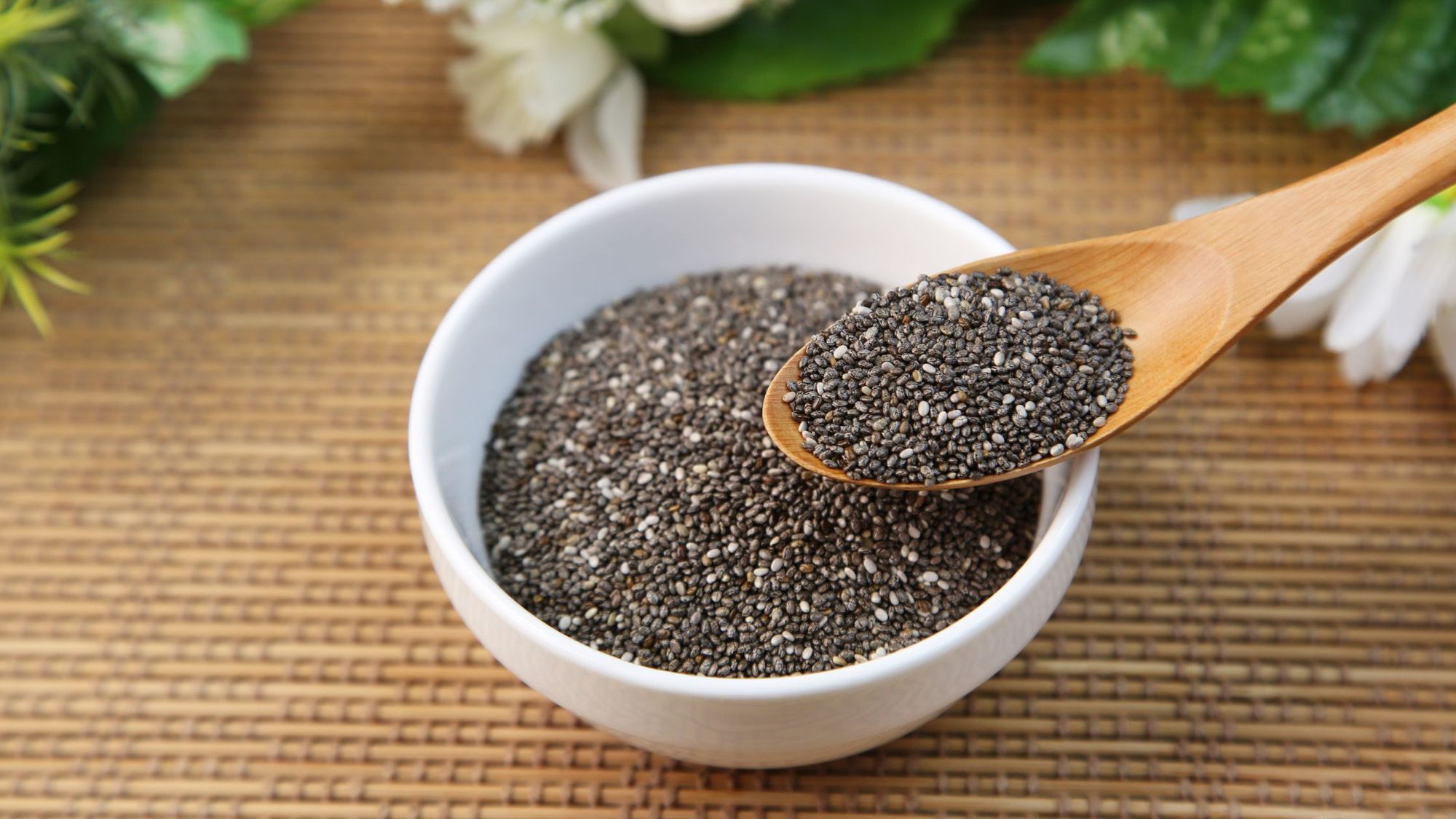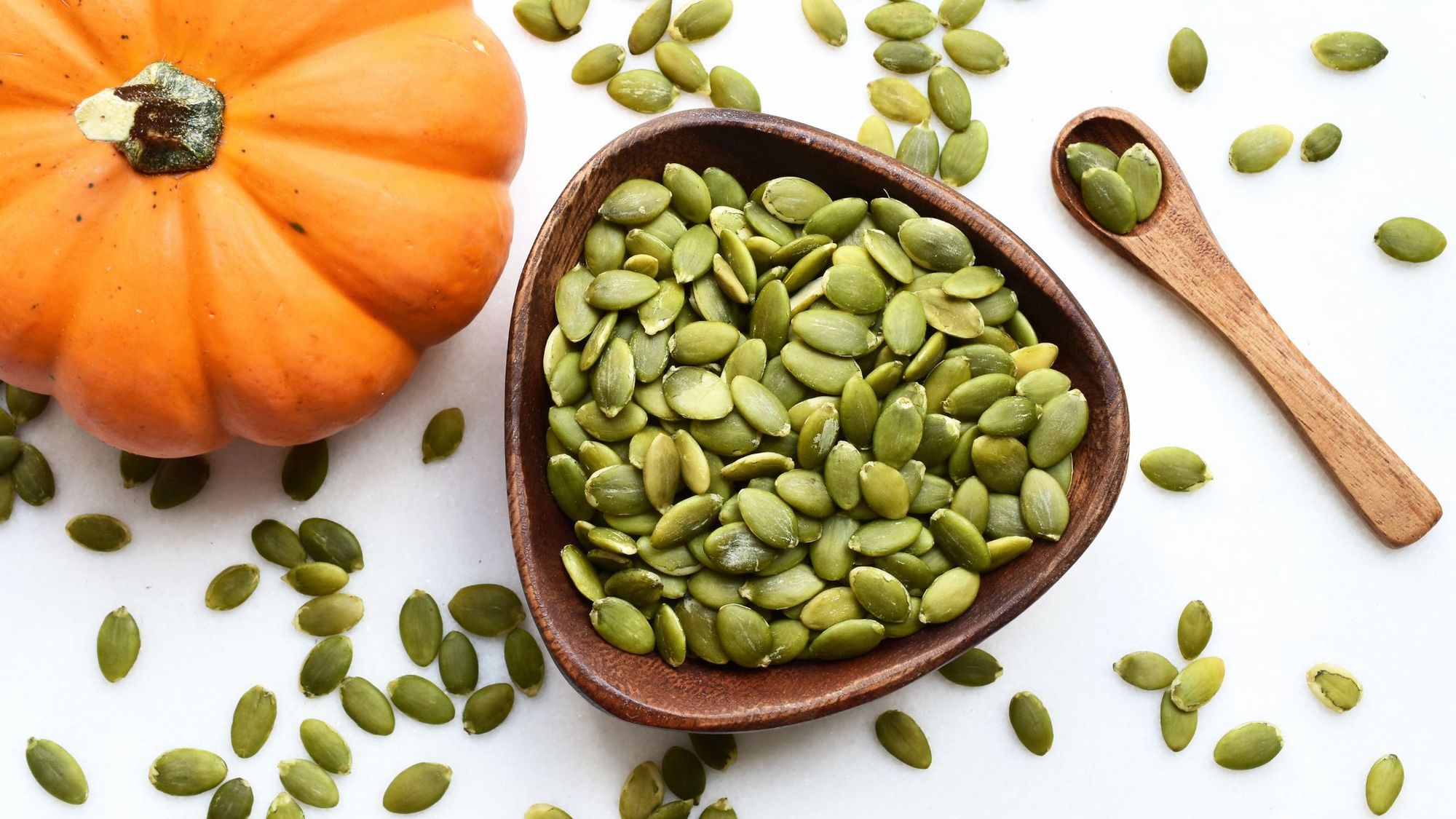
There are certain very healthy seeds you should definitely eat more of. The healthiest seeds out there contain essential nutrients such as crucial vitamins, minerals, omega-3 fatty acids, antioxidants, fiber, protein, and many more nutritional benefits.
The high nutritional content of the world’s healthiest seeds can help prevent certain types of cancer, reduce your risk of certain diseases, and improve your overall health and wellness.
Luckily, some of the healthiest seeds such as chia seeds and flaxseeds are incredibly easy to add to your diet. It can be as simple as throwing a tablespoon of these seeds into your morning smoothie before hitting the ‘blend’ button, sprinkling them on your yogurt or on your vegetables before roasting them, or adding a spoonful of them to your overnight oats.
Here’s What You Should Know About the Healthiest Seeds
To reap their health benefits, you don’t need to eat very much of these healthiest seeds. Because these seeds are so nutrient-dense, all you need is about one tablespoon per day to get the health benefits. Some of the healthiest seeds out there can be quite high in calories if you eat more than one tablespoon, such as chia seeds. Fortunately, you don’t need a large quantity of these nutrient-packed seeds per day in order to benefit greatly from consuming them.
In general, seeds contain all the substances that are necessary to grow into complex plants. This is why it makes sense that seeds can be incredibly nutritious.
Vegans, vegetarians, and anyone else on an ethical diet that reduces or eliminates animal byproducts, rely on these seeds. This is because these healthy seeds are fantastic plant-based sources of essential nutrients.
Below are 7 of the healthiest seeds you should definitely be incorporating into your diet:

1. Chia Seeds
Chia seeds are delicious, super filling, satisfying, and extremely nutritious. Why are chia seeds one of the healthiest seeds you can eat? Because these nutritious seeds are a fantastic source of magnesium, antioxidants, calcium, phosphorus, iron, zinc, and vitamins such as B-vitamins.
Chia seeds are also rich in fiber and omega-3 fatty acids.
The calcium and phosphorus in chia seeds contribute to your bone health, the fatty acids contribute to your brain health, the soluble fiber can reduce your risk of heart disease, and the antioxidants and omega-3 fatty acids contribute to overall heart health.
These nutritious seeds can also help you lose weight, because they’re incredibly filling. Since chia seeds expand in liquid, yogurt or overnight oats, they become very filling and reduce the odds you’ll overeat.
For example, try one of these healthy chia seed pudding recipes, which can be used as a filling and low-calorie dessert option or even as a healthy breakfast pudding.

2. Pumpkin Seeds
Pumpkin seeds are an excellent source of antioxidants, magnesium, zinc, iron healthy fatty acids, protein, fiber, and bone-healthy phosphorus.
Luckily, pumpkin seeds are equally delicious as they are nutritious. Roasted pumpkin seeds are one of the most delicious and nutritious snacks out there. This healthy snack is made by simply spreading washed and dried pumpkin seeds on a baking tray, and sprinkling olive oil, salt and pepper on them before baking in the oven until golden brown (about 20 minutes at 350.) Many people eat roasted pumpkin seeds on their own as a snack, and they’re much healthier than eating chips or crackers.
Some boutique fruit, nut and seed stores and some grocery store aisles even sell flavored roasted pumpkin seeds. Most of these are pretty healthy, as they simply have an added spice or curry powder on them.
Pumpkin seeds are also a unique source of vitamin K.
Your CircleDNA test might tell you that you have higher needs of certain nutrients, due to your genetic makeup. If the diet and nutrition reports in your DNA test reveal a possibly higher genetic need of vitamin K, pumpkin seeds should certainly be added to your diet, because you’ll get the vitamin K as well as many other nutritional benefits.
If you’re carving pumpkins this Halloween or making your own pumpkin puree for a pie, be sure to scoop out and save the pumpkin seeds!
3. Flaxseed
Flaxseed is another healthy seed that’s an excellent source of omega-3 fatty acids. Check out this article on the health benefits of omega-3 fatty acids and why it’s important to incorporate foods that contain omega-3 fatty acids into your diet.
Flaxseed is also considered to be one of the healthiest seeds out there because this type of seed is rich in fiber and protein.
This means that flaxseed can help control your appetite because foods that are good sources of fiber and protein help you feel fuller and more satisfied, reducing your odds to keep snacking.
For an extra-filling veggie burger, for example, add flaxseed to it. Or, if you’re making healthy protein pancakes for breakfast, put flaxseed in them.
Look for ground flaxseed at your local health foods store, because your body will more easily digest the nutrients if the flaxseed is ground. Plus, ground flaxseed is super easy to add to a veggie burger recipe, a smoothie recipe, or sprinkled on top of warm oats or fresh yogurt.
Flaxseed can also help reduce your cholesterol levels, regulate your blood sugar levels, and has properties that help protect you against certain cancers such as a reduced risk of breast cancer.
4. Hemp Seeds
One of the key reasons why hemp seeds are one of the healthiest seeds is its incredible source of vital nutrients such as magnesium and zinc. These two minerals are known for contributing to optimal wellness and brain health.
Hemp seeds are rich in protein, fiber, zinc, magnesium, iron, as well as omega 3 and omega 6 healthy fats.
Vegans and vegetarians love hemp seeds because they’re a great source of vegan protein. As far as plant protein goes, the protein found in hemp seeds is a very high quality plant protein.
Those who are lactose intolerant enjoy drinking hemp milk as a non-dairy milk alternative, because of the health benefits of hemp seeds.
In fact, hemp milk (which is made from hemp seeds) is one of the healthiest types of milk out there because hemp seeds are highly nutritious. Many people also add hemp seeds to their salads or mix them into their bowl of oatmeal.
5. Sesame Seeds
In addition to being a great source of healthy fats, protein, fiber and magnesium, sesame seeds can also help reduce inflammation in the body.
Sesame seeds help reduce inflammation and oxidative stress, which means someone with a health condition such as arthritis might benefit from eating more sesame seeds.
For example, this study revealed that people with knee osteoarthritis had less inflammatory chemicals in their blood after consuming 40 grams of sesame seed powder each day for two months.
Just like many of the other healthy seeds in this list, sesame seeds could also lower blood pressure, lower cholesterol, and contribute to your joint and bone health.
Many people appreciate sesame seeds for their B-vitamins. Furthermore, sesame seeds are very easy to incorporate into your diet.
Out of all the healthiest seeds in this list, sesame seeds are one of the most delicious tasting seeds out there. They can be sprinkled on top of sushi, on roasted broccoli, sprinkled on top of an Asian stir-fry, or even stirred into your favorite healthy dip such as stirring them into a hummus dip.
If you love Asian flavors in your meals, you’ll love adding sesame seeds to your Asian recipes such as in Asian noodles or healthy Asian tofu recipes.
6. Sunflower Seeds
You might already be eating sunflower seeds regularly, as they are a pretty popular snack. In fact, salted sunflower seeds are very tasty, and you can find bags of them everywhere such as at the gas station or at the supermarket.
Sunflower seeds have a great amount of vitamins and minerals. They contain B-vitamins, vitamin E, selenium, and other antioxidants. They also contain good amounts of protein, fiber, magnesium, and healthy omega-6 fats.
Aside from eating sunflower seeds on their own as a satisfying and healthy, salty snack, what else can you do with these nutritious seeds?
Try adding some sunflower seeds to an apple crumble dessert. Or, add them to your trail mix, your salads, or in homemade granola bars.
7. Poppy Seeds
Poppy seed bagels and lemon poppy seed muffins have made this delicious seed quite popular, but there are healthier ways to consume poppy seeds.
For example, if you’re going to use a little bit of butter to cook vegetables like asparagus or carrots, you can add a teaspoon of poppy seeds to the butter and it will taste amazing. Many people also add poppy seeds to their homemade salad dressing.
Poppy seeds are great for digestive health, and for strengthening your bones. Some research even shows that poppy seeds could enhance fertility.
Furthermore, poppy seeds are a good source of dietary fiber and complex B-vitamins. Additionally, these tasty seeds contain essential minerals such as calcium, iron, magnesium, potassium, and zinc.
Now that you know which seeds are the healthiest seeds, you can start adding them to your recipes and you’re sure to find many creative ways to incorporate them into your diet.






